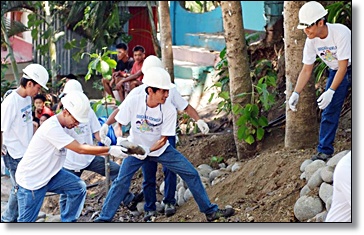Harambee Spirit Drives the Philippines

 |
|
Employees of STEAG State Power Inc. give Villanueva National High School a makeover during the launch of Brigada Eskwela. Photo courtesy |
People have successfully identified with the Harambee call to the extent that it now seems as a way of life. It is a Kenyan self help and self reliance movement. When the Harambee call was first used, it was to alert Kenyans towards nation building efforts and served as a political call to enable people participate in raising education funds, building social amenities required by a community, being mindful of the plight of others in all aspects of human life, raising bursary funds for education, national disasters, health and medical care.
In the Philippines, the ‘Harambee’ spirit is well portrayed by the Department of Education’s Brigada Eskwela, or the National Schools Maintenance Week. In essence Brigada Eskwela is a nationwide voluntary effort of teachers, parents, students, community members, and other organizations to do minor repairs and clean-ups on their schools in preparation for the start of the school year. This week-long event began in 2003 as part of the Oplan Balik Eskwela Program and National Maintenance Week of the Philippine Department of Education (DepEd).
Now on its eighth year of implementation, the program focuses on minor repairs such as painting of roofs, cementing existing footpaths, fixing leaking water pipes, repairing toilets, painting classroom walls, replacing ceiling boards, repairing chairs, desks and cleaning the surroundings, among others with the help of parents and local volunteers. The program is closely monitored by school principals and division superintendents to ensure its success. As early as February, school heads recruit volunteers who would participate in the brigade, by March, they would approach local businesses for donations, then organize work groups by April. It is usually held two weeks prior to every year's opening of classes. The objective of Oplan Balik Eskwela is to address the problems commonly experienced during the start of the school year and coordinates efforts of other government agencies towards the same end. It also makes sure that students are properly enrolled and able to attend school on the first day. This activity is usually targeted for public educational institutions in the country.
A manual for school heads has been developed to aid in successful implementation of the program. According to excerpts from the manual, it was with this spirit of volunteerism and public-private partnership for education that Republic Act 8525, or the “Adopt-A-School Act” was made in 1998. Through the Adopt-A-School Program (ASP), private sector companies and professionals are given the opportunity to contribute in improving the public education system of the country. To recognize their goodwill, they can avail of tax incentives of up to 150%. Over the years, the Adopt-A-School Program has attracted more than 200 partners, generating some P6 billion worth of projects and interventions. In its effort to bring the spirit of the Adopt-A-School Program to the community level and maximize civil participation and utilize local resources to improve the public schools, the Department of Education launched the National Schools Maintenance Week in May 2003. Dubbed, Brigada Eskwela, the program brought together teachers, parents and community members every third week of May to work together in repairing and preparing public schools for school opening. In the spirit of community spirit (bayanihan), private institutions/individuals and even the local government units contributed in generating resources for the effort. In 2007 alone, Brigada Eskwela hit a record high of 90% participation among school communities, generating more than P2.5 billion (US$58 million equivalent) worth of support-in kind and volunteer man-hours. It has proven to continue to gain more mileage among communities, corporations, small-medium enterprises, government and non-government organizations and private individuals.
Over the years, the Brigada Eskwela effort has evolved from a week-long cleaning-up and beautification exercise to a festive coming together of students, teachers, school officials, parents, community members, local government officials, non-government organizations, church groups and the private sector. It, too, has become one of DepEd’s major initiatives in enjoining local communities to respond to the needs of public schools and be part of a nationwide effort towards improving Philippine basic education. Indeed, Brigada Eskwela is becoming DepEd’s model of genuine public and private partnership in action and serves as one of its frontline initiatives reminding each and every Filipino that of their role as stakeholders in the country’s education. Indeed a true essence of the spirit of ‘Harambee’ at play in the Philippines worthy of consideration for adoption in Kenya.
By Satwinder Rehal
Associate Professor, De La Salle College of Saint Benilde
Manila, The Philippines.
